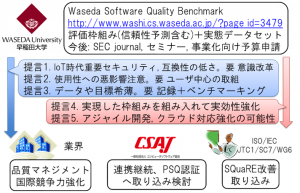Hironori Washizaki, “Waseda Software Quality Benchmark,” ISO/IEC/JTC1 SC7/WG6 Plenary Meeting Kuantan, May 18, 2017.
Hironori Washizaki, “Waseda Software Quality Benchmark,” ISO/IEC/JTC1 SC7/WG6 Plenary Meeting Kuantan, May 18, 2017.
早稲田大学グローバルソフトウェアエンジニアリング研究所が、一般社団法人コンピュータソフトウェア協会(CSAJ)との協力のもと、独立行政法人情報処理推進機構からのRISE委託研究「測定評価と分析を通じたソフトウェア製品品質の実態定量化および総合的品質評価枠組みの確立」の成果を取りまとめました。
 本調査研究は、市販されているソフトウェア製品について、国際規格ISO/IEC25000(SQuaRE)シリーズに基づくメトリクスによってその品質を調査し定量化を図るとともに、品質評価の指標を策定するものです。具体的には、PSQ認証取得企業を中心に本調査に協力した21製品を対象に、異なる品質間の関係を総合的に実証した世界初のベンチマークとなり、Waseda Software Quality Benchmark(WSQB2017)と名付けて一般に公開されました。CSAJ及びPSQ認証事業は本研究を引き続きテーマとしてゆく早稲田大学との連携体制と協力関係を継続し、産学連携を進めます。
本調査研究は、市販されているソフトウェア製品について、国際規格ISO/IEC25000(SQuaRE)シリーズに基づくメトリクスによってその品質を調査し定量化を図るとともに、品質評価の指標を策定するものです。具体的には、PSQ認証取得企業を中心に本調査に協力した21製品を対象に、異なる品質間の関係を総合的に実証した世界初のベンチマークとなり、Waseda Software Quality Benchmark(WSQB2017)と名付けて一般に公開されました。CSAJ及びPSQ認証事業は本研究を引き続きテーマとしてゆく早稲田大学との連携体制と協力関係を継続し、産学連携を進めます。
この公開を記念して、成果を詳しくご紹介するセミナーを6月2日に開催します。またセミナーでは、ご協力いただいた製品ご提供元からの本調査研究への参画・活用事例のご紹介、ならびに、プロジェクトエディタによるSQuAREシリーズ活用方法の招待講演を予定しています。さらにパネル討論では、IoT時代の今後のソフトウェア品質のあり方を、会場と共に議論します。
参加費無料です。ぜひご参加ください。
共催: 早稲田大学グローバルソフトウェアエンジニアリング研究所、一般社団法人コンピュータソフトウェア協会(CSAJ)
協賛: 一般社団法人IT検証産業協会(IVIA)
後援: 独立行政法人情報処理推進機構(予定)
日時: 2017年6月2日(金)13:30-17:30
場所: 早稲田大学グリーンコンピューティング研究開発センター 1階 セミナー室(東京メトロ 東西線・早稲田駅)
参加費: 無料
参加申込: http://www.washi.cs.waseda.ac.jp/?page_id=3910
Hironori Washizaki, Yusuke Sunaga, Masashi Shuto, Katsuhiko Kakehi, Yoshiaki Fukazawa, Shoso Yamato, Masashi Okubo, Bastian Tenbergen, “Combinations of Personal Characteristic Types and Learning Effectiveness of Teams,” 41st IEEE Computer Society Signature Conference on Computers, Software, and Applications (COMPSAC 2017), J1/C2 – Journal First, Conference Second Scheme, Torino, Turin, Italy, July 4-8, 2017.
Shinpei Ogata, Yukiya Yazawa, Kozo Okano, Haruhiko Kaiya, Hironori Washizaki, “Traceability Link Mining – Focusing on Usability -,” 41st IEEE Computer Society Signature Conference on Computers, Software, and Applications (COMPSAC 2017), Fast Abstract, Torino, Turin, Italy, July 4-8, 2017.
Masashi Shuto, Hironori Washizaki, Yoshiaki Fukazawa, Shoso Yamato, Masashi Okubo and Bastian Tenbergen, “Relationship Between the Five Factor Model Personality and Learning Effectiveness of Teams in Three Information Systems Education Courses,” 18th IEEE/ACIS International Conference on Software Engineering, Artificial Intelligence, Networking and Parallel/Distributed Computing, June 26-28, 2017, Kanazawa, Japan. (to appear)(CORE Rank C)
Although working in teams is an effective method for students to learn skills necessary for information systems, the optimal combination of team members to maximize the learning effectiveness has yet to be clarified. This study investigates the relationship between the combination of students’ personality characteristics and learning effectiveness in three information system lecture courses. Two Five Factor Model (FFM) questionnaires were used to determine each student’s personality characteristic. For each course, which has different styles, several different relationships are found. This study should assist educators in maximizing students’ learning effectiveness in information systems courses involving teamwork.
Taketo Tsunoda, Hironori Washizaki, Fukazawa Yosiaki, Inoue Sakae, Yosiiku Hanai and Kanazawa Masanobu, “Evaluating the Work of Experienced and Inexperienced Developers Considering Work Difficulty in Software Development,” 18th IEEE/ACIS International Conference on Software Engineering, Artificial Intelligence, Networking and Parallel/Distributed Computing, June 26-28, 2017, Kanazawa, Japan. (to appear)(CORE Rank C)
Previous studies have researched how developer experience affects code quality, but they ignore work difficulty, although experienced developers are more likely to work on the more complex parts of a project. To examine work difficulty, we focus on revised files. Using product metrics, we evaluate file complexity in each type of file origin. Specifically, we analyze three large commercial projects (each project has about 250,000 LOC) executed by the same organization to analyze the relationship between previous project experience and developer’s work. Although experienced developers do not always work on more complicated files, they introduce fewer defects, especially if the difference in work difficulty is not significant.
Haruhiko Kaiya, Ryohei Sato, Atsuo Hazeyama, Shinpei Ogata, Takao Okubo, Takafumi Tanaka, Nobukazu Yoshioka and Hironori Washizaki, “Preliminary Systematic Literature Review of Software and Systems Traceability,” 21st International Conference on Knowledge-Based and Intelligent Information & Engineering Systems (KES 2017), Session on Networks for Innovation, Knowledge Creation and Sharing, Marseille, France, Sep 6-8, 2017. (to appear)(CORE Rank B)
Traceability is important knowledge for improving the artifacts of software and systems and processes related to them. Even in a single system, various kinds of artifacts exist. Various kinds of processes also exist, and each of them relates to different kinds of artifacts. Traceability over them has thus large diversity. In addition, developers in each process have different types of purposes to improve their artifacts and process. Research results in traceability have to be categorized and analyzed so that such a developer can choose one of them to achieve his/her purposes. In this paper, we report on the results of Systematic Literature Review (SLR) related to software and systems traceability. Our SLR is preliminary one because we only analyzed articles in ACM digital library and IEEE computer society digital library. We found several interesting trends in traceability research. For example, researches related to creating or maintaining traceability are larger than those related to using it or thinking its strategy. Various kinds of traceability purposes are addressed or assumed in many researches, but some researches do not specify purposes. Purposes related to changes and updates are dominant.
Rizki Amelia, Hironori Washizaki, Yoshiaki Fukazawa, Keishi Oshima, Ryota Mibe, Ryosuke Tsuchiya, “An Empirical Study on Relationship Between Requirement Traceability Links and Bugs,” Journal of software (JSW), 2017. (DBLP Indexed)
Early bug detection reduces the cost of software maintenance; but none of previous works have utilized requirement traceability links (RTLs) as a predictor for bugs. To discuss how to use RTLs to predict the number of bugs, we propose an RTL recovery approach classification based on the ease of the recovery process. Based on that, we investigated the relationship using data from industrial software. We confirmed that classes related to more RTLs tend to have more bugs, and the classification gives better correlations although including RTL in the bug prediction model does not affect the performance. Some class files with no and low RTLs also have bugs; we hypothesize that this occurs because the actual RTL is missing or not established, which is supported by the observation that bugs in these classes are highly correlated with maximum cyclomatic complexity.
Tech2GO/CodeCamp, 子供達が楽しんで取り組める「プログラミング教育」とは?【G7プログラミングラーニングサミット2017東北~】, 2017年4月13日